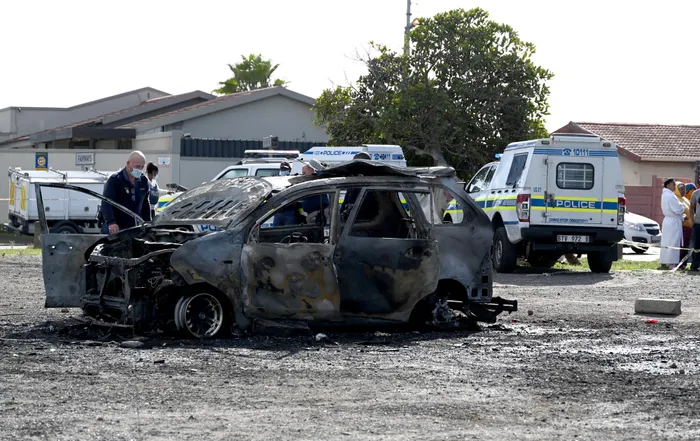Western Cape vigilante killings rise as distrust in police grows

E-haling driver Abongile Mafalala’s car was torched and he died after being severely assaulted and set alight in a mob justice attack in Parkwood on Tuesday. Picture: Ayanda Ndamane /African News Agency (ANA)
Crime experts say growing cases of vigilantism point to a lack of trust in the police’s ability to effectively fight crime.
The Western Cape recorded 60 vigilante killings in the first three months of the year an increase of 55 from the previous quarter.
In the most recent incident this week, e-hailing driver Abongile Mafalala was brutally assaulted and set alight in Parkwood, when an incensed group of residents confronted him after rumours spread of a kidnapping of two young girls from the area earlier that morning.
Minister of Police Bheki Cele released crime statistics on Friday showed 358 people were killed by vigilantes in the country and the Western Cape recorded the fourth highest figure after the Eastern Cape, Gauteng and KwaZulu-Natal.
Cele said vigilantism was among the top four causes of murders in the country.
Lizette Lancaster, a crime and justice expert, said instances of vigilantism were often linked to people’s loss of confidence in the police’s ability to tackle crime.
“People accepted this type of violence over a period of time because they feel police are unable to deal with criminals.”
Lancaster said while some middle class residents have access to private security, others depended on neighbour structures.
“In other communities you get the community policing forums and most of the time the residents work with these sectors when a criminal is caught, but then we get those who lost confidence in the police, so they end up crossing the line by dishing out punishment.”
Lancaster added that the spread of fake information could also incriminate those spreading it.
“It is seen as an incitement. Misinformation can never be used to justify criminal actions and these instigators can be brought to book, even though there haven’t been many successful cases thereof.”
Lancaster said even though vigilantism was on the increase, there was still hope for change.
“Police need to become more responsible and people need to communicate better.”
Crime expert Guy Lamb described the act of vigilantism as a moral panic.
“This act stems from fear, where a community is affected, and where there are children affected. It also brings fear and frustration.”
“Police response contributes to this, the lack of professionalism, the under resourcing and lack of feedback.
“And because of its unpredictability, this type of action can also lead to innocent people becoming a victim of mob justice.”
Police spokesperson Colonel Andre Traut said unregulated social media allowed people to create and spread fake news without being held accountable.
“Kidnapping is a crime that require responsible communication, and the spreading of misinformation can jeopardise a sensitive police investigation.
“We request the public to verify the source and authenticity of the information before sharing it on social media platforms. We are mindful that social media is extremely beneficial when the public’s assistance is required or information is sought.”
A Parkwood resident, who spoke to Weekend Argus on the basis of anonymity for fear of being victimised, said he had no faith in the police.
“Police have been failing our people for a long time. We go there to open cases then we don’t hear from them again.
“Imagine what those people were thinking when they heard someone tried kidnapping our children, then we wait for hours while the children are long gone, they keep condemning but they never react,” he said.

Western Cape MEC for Community Safety and Policing Oversight Reagen Allen condemned Mafalala’s murder.
“Under no circumstances should community members take the law into their own hands. We cannot have anarchy. We need to allow the SAPS to investigate and attend to crime,” he said.
Allen also condemned an incident in Mitchells Plain where a scholar transport vehicle was pelted with stones after word spread about unsubstantiated claims.
Allen said the driver managed to drive away from the riotous crowd.
“Although there are allegations of attempted child abduction, this was not confirmed by SAPS. Mitchells Plain police are investigating cases of public violence and malicious damage to property, and suspects are yet to be arrested.
“It is important that residents do not spread false information or fake news without verifying matters. This could lead to harm being brought on to others, which could make you liable, as you participated in the distribution of the false information that led to the commission of the crime.”
Related Topics: